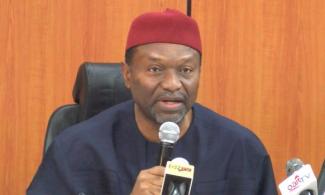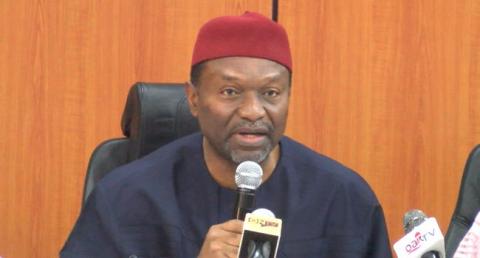
“When you look at our situation, our debt is not bad at all. Our debt/GDP is about 19 per cent. The average for sub-Saharan Africa is about 57 per cent. So ours is quite moderate. Our debt is sustainable. We are concerned about our revenues. So, we have been trying to raise our revenues.

Udoma Udo Udoma, Nigeria’s Minister of Budget and National Planning, has said Nigeria's debt profile is "not bad", considering the average for sub-Saharan Africa.
He stated this in an interview with Vanguard on the sidelines of the World Bank International Monetary Fund (IMF) meetings in Bali, Indonesia.
While maintaining that the country’s debt to GDP ratio is 19 per cent, the former Senator noted that the average for sub-Saharan Africa is 57 per cent, which gives Nigeria a clean-bill of health.
“When you look at our situation, our debt is not bad at all. Our debt/GDP is about 19 per cent. The average for sub-Saharan Africa is about 57 per cent. So ours is quite moderate. Our debt is sustainable. We are concerned about our revenues. So, we have been trying to raise our revenues.
"So far, the numbers from the FIRS shows that our tax collection for both oil and non-oil is about 30 to 35 per cent higher than it was, last year. That is good, although we would like to do much better than that,” he stated.
On the performance of the 2017 budget, the minister disclosed that 86 per cent of what the Federal Government sought to achieve with its spending plan for the previous year was done. All debt servicing obligations were made and N1.44 trillion was released for capital projects.
“Overall, the 2017 budget implementation was about 86 per cent.Capital releases was at N1.44 trillion, the highest ever, while recurrent was almost 100 per cent. All debt service obligations were fully met," he said.
On the recovery of the economy, he explained that growth was on a steady climb, noting that the country had moved from a 0.8 per cent expansion rate to 2.1 per cent:
He said: "As you know, we went into a recession in 2016. We developed policies to get us out of recession. Those policies were encapsulated in a single document called the Economic Recovery and Growth Plan (ERGP). That plan involved investing in both oil and non-oil (sectors). We did both.
“Part of that plan was that we will engage with the communities in the Niger Delta to get a more favourable environment for oil production and then non-oil: agriculture, solid minerals, manufacturing and so on, to fire on all cylinders. Since the plan was launched and we started implementing it, we have got out of recession and we are beginning to grow.
“In 2017, our growth was 0.8 per cent. By half year, this year, we were on 1.5 per cent. We are hoping that by the end of the year, we will be growing at 2.1 per cent. That is our target for this year. For next year, we are hoping that we will be growing at 3 per cent.
“The IMF projection is that Nigeria will grow by 1.9 per cent this year, which, coming from 0.8 per cent last year, is good progress. Our projection is 2.1 per cent. The difference is not great. With our projection, it is clear that the economy is making good progress. So the economy is moving in the right direction."
IN 2017, Nigeria budgeted N1.8 trillion for debt servicing. As at June 2018, data from the Debt Management Office shows that the country’s debt profile stands at N22.38 trillion.
Using data from the Office of the Accountant General of the Federation and the Budget Office, the funds Nigeria spent in servicing its debt was 70 per cent of revenue earnings in the first quarter of 2017. At the last Monetary Policy Committee meeting, CBN governor, Godwin Emefiele, said weak fundamentals might cause the country’s economy to slip back into recession. One of the factors he highlighted was a 0.04 per cent slide in economic growth and increasing debt owed to contractors. This viewpoint puts a spin on Udoma’s positive outlook in Bali.